UNESCO Chair Activities: 2022-2024
April 2022
April 22: Publication of ‘Breaking the News’
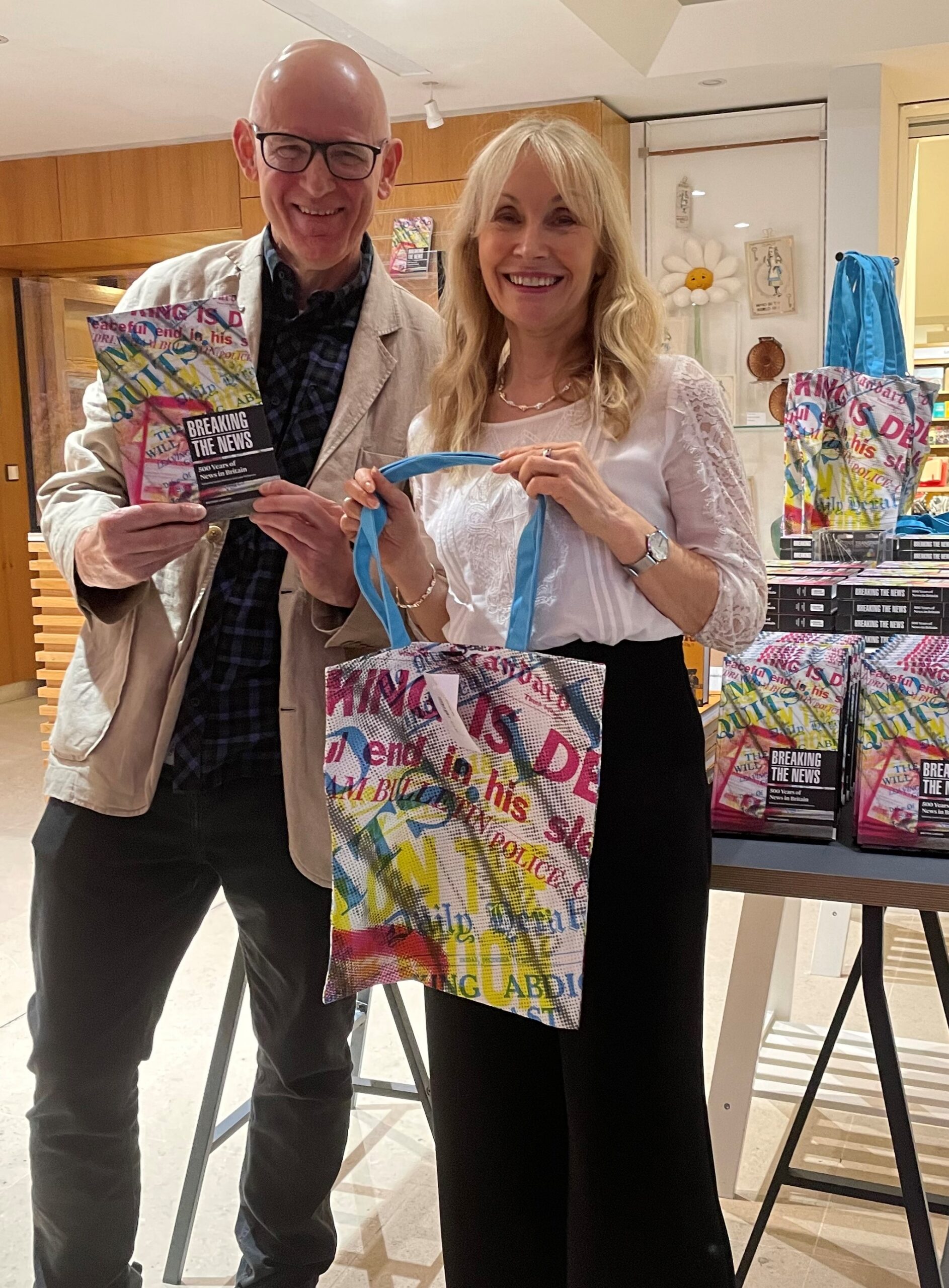
A British Library exhibition took place from April 2022 until August 2022 that focused on the role that news plays in society. The exhibition spanned five centuries and was supported by Newswork to ‘explore issues of choice, interpretation, truth and trust in the media’. The exhibition examined the importance of a free press and how news has evolved, alongside what objective news means and the ethics involved in news stories. The exhibition tied into a book that was edited by the UNESCO Chair, Professor Jackie Harrison and Luke McKernan, lead curator of the exhibition, entitled: Breaking the News: 500 Years of News in Britain.
April 20: Meeting with UK Ambassador to UNESCO, Paris
On a visit to UNESCO, Paris, France, the UNESCO Chair and the UNESCO Chair coordinate met with UK Ambassador to UNESCO Laura Davies. The UNESCO Chair recorded a video explaining the UN Plan of Action on Journalism Safety and the Issue of Impunity. She discussed the importance of the document and how it has helped a multistakeholder group to come together and tackle the issue of impunity. She also discussed the role that academia can play in helping to understand the threats that journalists face and how it can help knowledge exchange take place too.
May 2022
May 2-5: World Press Freedom Day, Punta del este, uruguay
CFOM researchers travelled to Punta del Este, Uruguay to take part in World Press Freedom Day 2022. Members of the CFOM team took part in a panel session at the seventh Academic Conference focused on human rights standards and working conditions of journalists during crisis. The UNESCO Chair and CFOM members Dr Silvia Chocarro, Dr Tarlach McGonagle, Dr Sejal Parmar, Dr Sara Torsner, delivered a paper focusing on Human Right Council Resolutions entitled: ‘Closing the normative gap: What ten years of Human Right council Resolutions tell us about its approach to the safety of journalists’. The Academic Conference hosted a number of panels focusing on different themes concerning journalism safety, such as digital safety and gender-specific safety attacks. CFOM Education Lead, Dr Lada Price, also presented her work on supporting research and teaching on trauma literacy and resilience. The Conference was jointly organised by the University of the Republic and UNESCO.
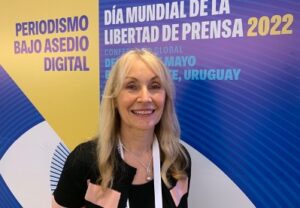
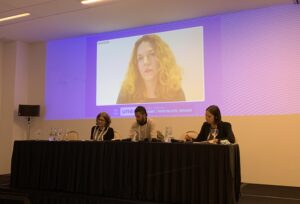
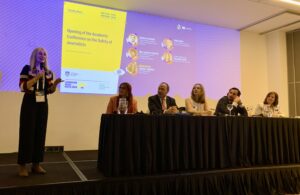
May 3: Launch of the Academic Consultation on occassion of the tenth anniversary of the UN Plan of Action
On occasion of the tenth anniversary of the UN Plan of Action on Journalism Safety and the Issue of Impunity, CFOM was asked to lead the academic consultation. The academic consultation was launched at World Press Freedom Day by the UNESCO Chair who explained that it would be a collaborative effort to develop specific ways in which academia can contribute to, support and strengthen the future successful implementation of the UNPA.
May 30: First round of the Academic Consultation
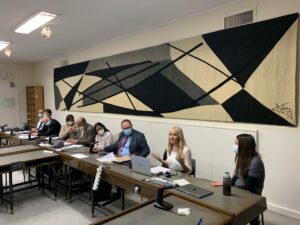
The first round of the academic consultation took place at UNESCO HQ, Paris. It was attended by 29 academics from around the world and served as a starting point to map out relevant academic research and how to define key concepts in ways that are relevant to policy-makers, recognising that the concepts may need to evolve to accommodate the impact of digital threats and encompass a gender-sensitive approach. It also included a discussion of how academia can best support the implementation of the UNPA and its related policy agendas on protection, prevention and prosecution.
June 2022
June 6: Publication of Safety of journalists and media freedom: trends in non-EU countries from a human rights perspective
The UNESCO Chair and Dr Sara Torsner wrote a policy brief for the European Parliament focusing on the decline of media freedom: Safety of journalists and media freedom: trends in non-EU countries from a human rights perspective. They noted how there had been an increase in targeted attacks on the media, including non-lethal physical violence; legal, digital, psycho-social, gender and identity-based intimidation; and state-led capture of the media landscape. Their findings showed that political journalism remains most at risk, that major social shocks or crisis have been used as pretext for intrusive government measures and, finally, that there is a decline in media plurality and independence
June 9: Second round of the Academic Consultation
The second round of the academic consultation was held at the International Association of Media and Communication Research (IAMCR) Conference and focused on the continuing implementation of the UNPA and how it can be supported through effective knowledge exchange and impactful collaboration between academic and non-academic actors thereby contributing to bridging the gap between theory and practice. This event was a UNESCO/JSRN/CFOM Panel entitled “Addressing new challenges and changing contexts relating to the contemporary risks facing both journalism and journalists: Scoping a new research agenda”. It included 4 presenters and 27 attendees comprising of scholars, policy makers and representatives from civil society around the world.
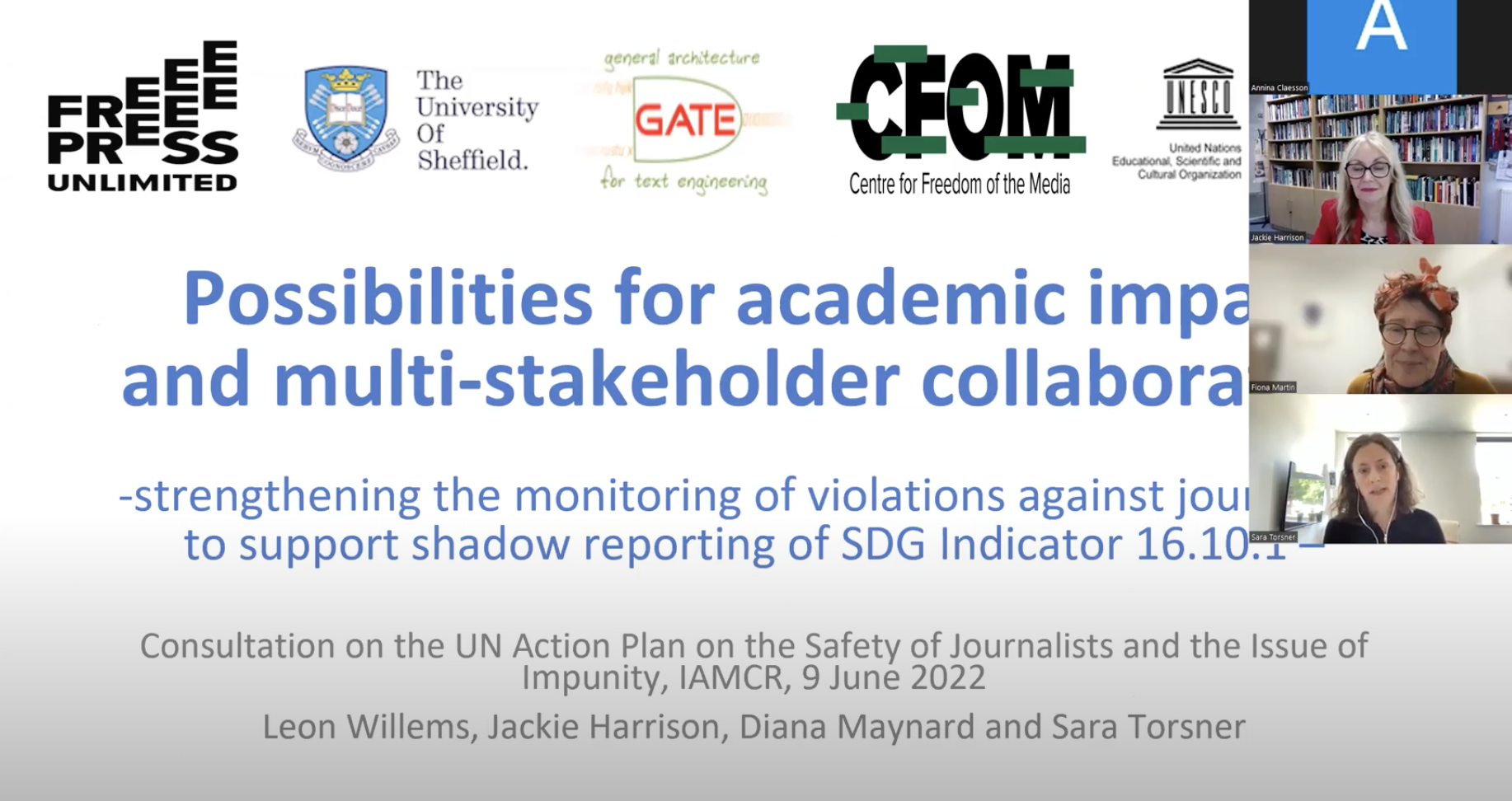
July 2022
July 15: International Association of Media and Communication Research (IAMCR) Conference
The Journalism Safety Research Network hosted a multi-paper panel focusing on emerging areas of research in journalism safety in response to the intensified precarity due to increasingly unsafe conditions journalists face. The panel hosted four papers and the UNESCO Chair presented with Dr Sara Torsner on ‘Understanding journalistic precarity via a typology of the civil-communicative conditions of journalism’. The UNESCO Chair also moderated a FlashTalk session where academics spoke on possibilities for academic impact and multi-stakeholder collaboration: the experience of international human rights organisation
September 2022
September 13: Forum for Media and Development Symposium in hamburg: ‘Dealing with the past and preparing for the future – Media Assistance in Conflict Mitigation, Reconciliation and Peacebuilding’
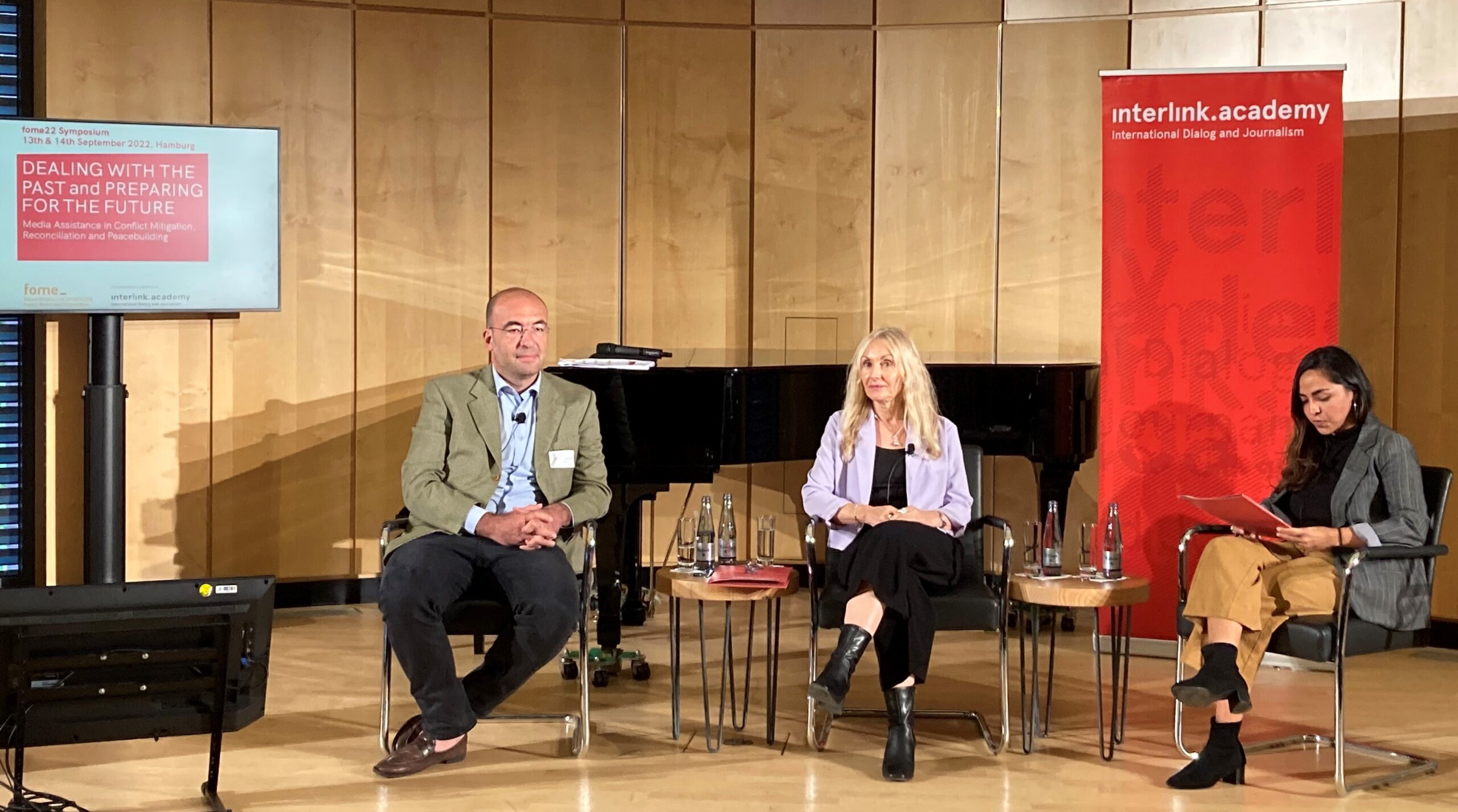
On 13 September, the UNESCO Chair joined discussions on how to end impunity for crimes against journalists at the 2022 Forum for Media and Development Symposium ‘Dealing with the past and preparing for the future – Media Assistance in Conflict Mitigation, Reconciliation and Peacebuilding’. The session was hosted by Reporters Without Borders and focused on ending impunity for crimes against journalists as one of the most pressing issues to guarantee freedom of expression and access to information for all citizens. The UNESCO Chair highlighted the role of academia in implementing the UNPA and the academic consultations. She also showcased the work undertaken to take stock of the research conducted since the adoption of the UN Action Plan in 2012.
September 19-20: Workshop for Global Community of Press Freedom Organisations, The Hague
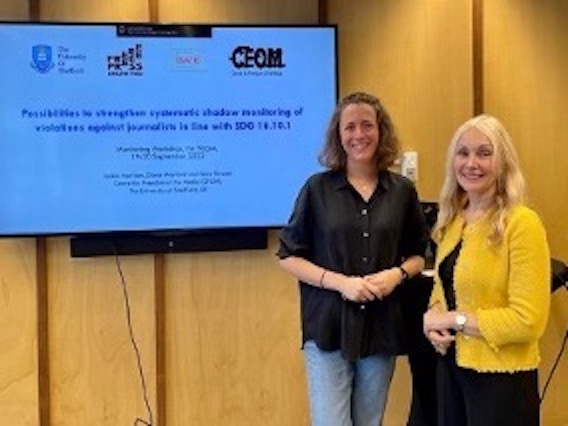
On September 19-20 the UNESCO Chair, Dr Diana Maynard and Dr Sara Torsner participated in a workshop hosted by Free Press Unlimited and discussed possibilities to strengthen systematic shadow monitoring of violations against journalists in line with SDG 16.10.1.
September 28: Third round of the Academic Consultation
This third round of the academic consultation focused on draft recommendations developed by CFOM based on the previous two rounds and these were shared, presented and discussed with other members of the global academic community who had not attended the two earlier rounds. They were also separately shared with those who had previously participated in rounds 1 and 2. 19 participants attended.
October 2022
October 26: European Parliament Subcommittee on Human Rights
On 26 October, the UNESCO Chair took part in a panel discussing trends in journalism safety at the European Parliament Subcommittee on Human Rights based on the policy brief: ‘Safety of journalists and media freedom: trends in non-EU countries from a human rights perspective’ that was written by Professor Harrison and CFOM Research Associate, Dr Sara Torsner and published by the European Parliament in June 2022. The UNESCO Chair summarised the current trends in journalism safety, noting that while the number of killings of journalists has decreased, there has been growth in other targeted attacks, such as non-lethal physical violence, legal, digital and psycho-social intimidation. She spoke of the political contexts in which these attacks take place alongside suggesting recommendations for the European Parliament and other EU institutions to adopt.
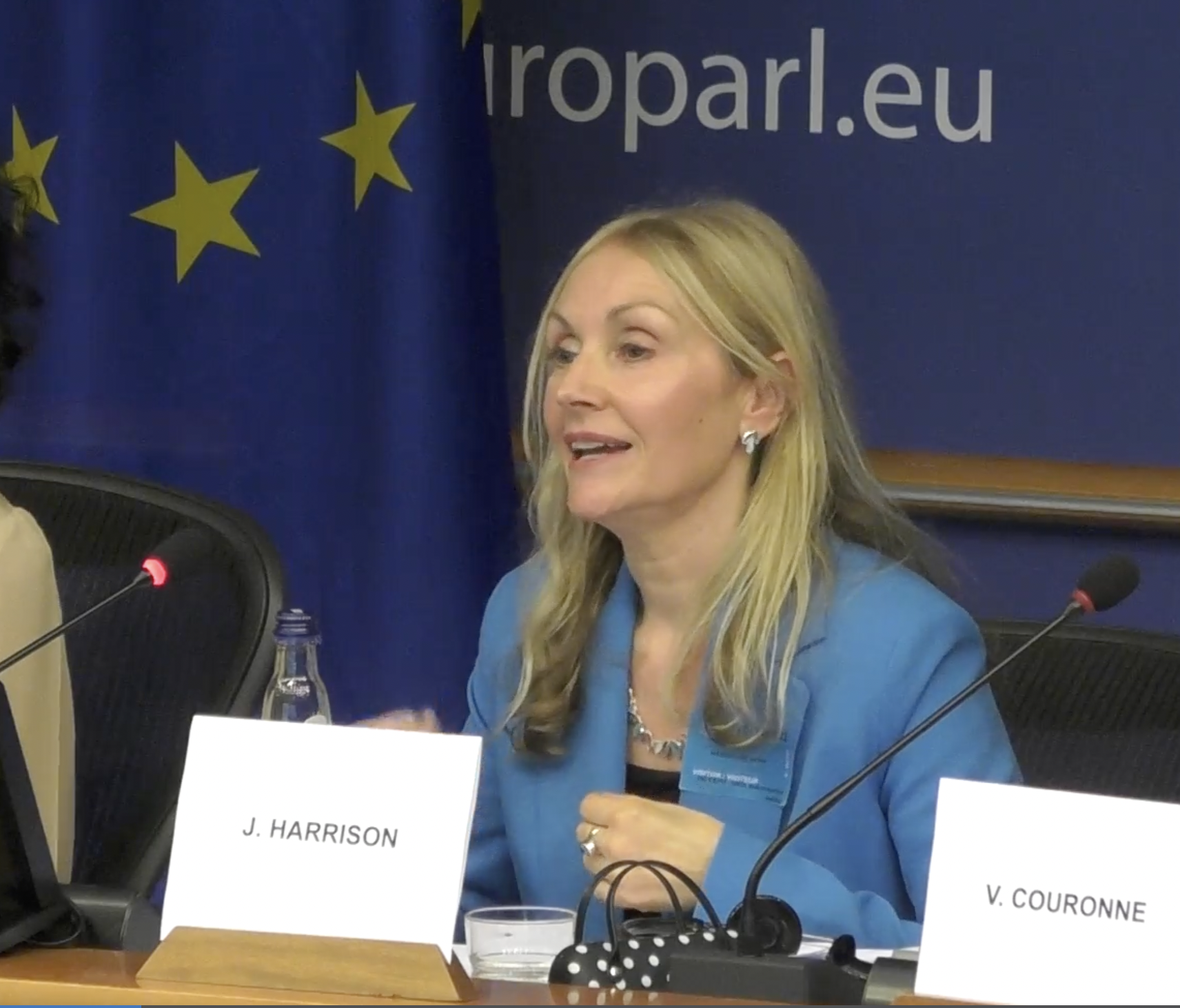
November 2022
November 2: Publication of The Chilling: A global study of online violence against women journalists
The International Center for Journalists (ICFJ) and UNESCO published ‘The Chilling: A global study of online violence against women journalists’. The report, which has been a collaboration with CFOM, is a ground breaking global study that details the trends of online violence against women journalists alongside offering solutions to this problem. The Chilling includes 850 testimonies from women worldwide alongside a social media analysis. The analysis of 3 million tweets made up three big data case studies that were undertaken with the University of Sheffield and CFOM computer scientists. The work has been led by ICFJ’s and CFOM’s Senior Researcher Dr Julie Posetti and ICFJ’s Senior Research Associate Nabeelah Shabbir. CFOM members Professor Kalina Bontcheva, the UNESCO Chair Professor Jackie Harrison, Dr Diana Maynard and Dr Sara Torsner were senior researchers in the team. The project has also been published on The Guardian’s website.
November 3-4: Safety of Journalists: Protecting Media to Protect Democracy High Level Conference
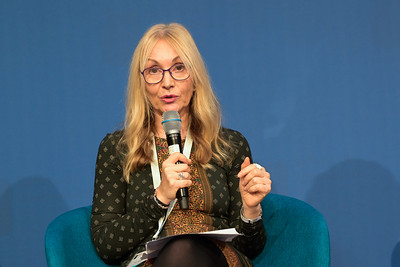
An overview of the findings of the academic consultation were presented by the UNESCO Chair at the Safety of Journalists: Protecting Media to Protect Democracy High Level Conference in Vienna, Austria on 3-4 November 2022. Professor Harrison delivered a presentation at the Pre-Conference on the 3 November where she highlighted the key trends in journalism safety that had been raised during the three rounds of the academic consultation, alongside reflecting the current landscape of literature published in the area. Key areas highlighted included digital threats, misuse of legislation and gender-specific safety issues.
Recommendations were discussed as to how academia can continue to contribute towards understanding the threats that journalists face. These included developing a journalism safety curriculum and there were also calls for sufficient resources to be given to academics to further research, such as through financial and human resources support. The academic report has been published by UNESCO and some of the key issues highlighted in their Outcome document.
7-10 November: International Journalism Week
International Journalism Week took place from 7 until 10 November organised by the School of Journalism, Communication and Media, University of Sheffield and CFOM. The theme of IJW focused on journalism in times of conflict and tension. The UNESCO Chair delivered a keynote address focusing on the threats that journalists face during times of conflict and tension. CFOM’s International Director then moderated two panels on 10 November focusing on the theme of ‘Reporting from Ukraine at war: Issues and perspectives’. The first panel, Reporting from the Front Line, opened with a recording from the President of the National Union of Journalists of Ukraine, NUJU, Sergiy Tomilenko. Clothilde Redfern, Director of the Rory Peck Trust also spoke on the panel. The second panel opened with Oksana Romaniuk, Director of the Institute for Mass Information. Taras Fedirko, a British Academy Research Fellow at the University of St. Andrews then spoke about the complexity of reporting the war and the role of propaganda
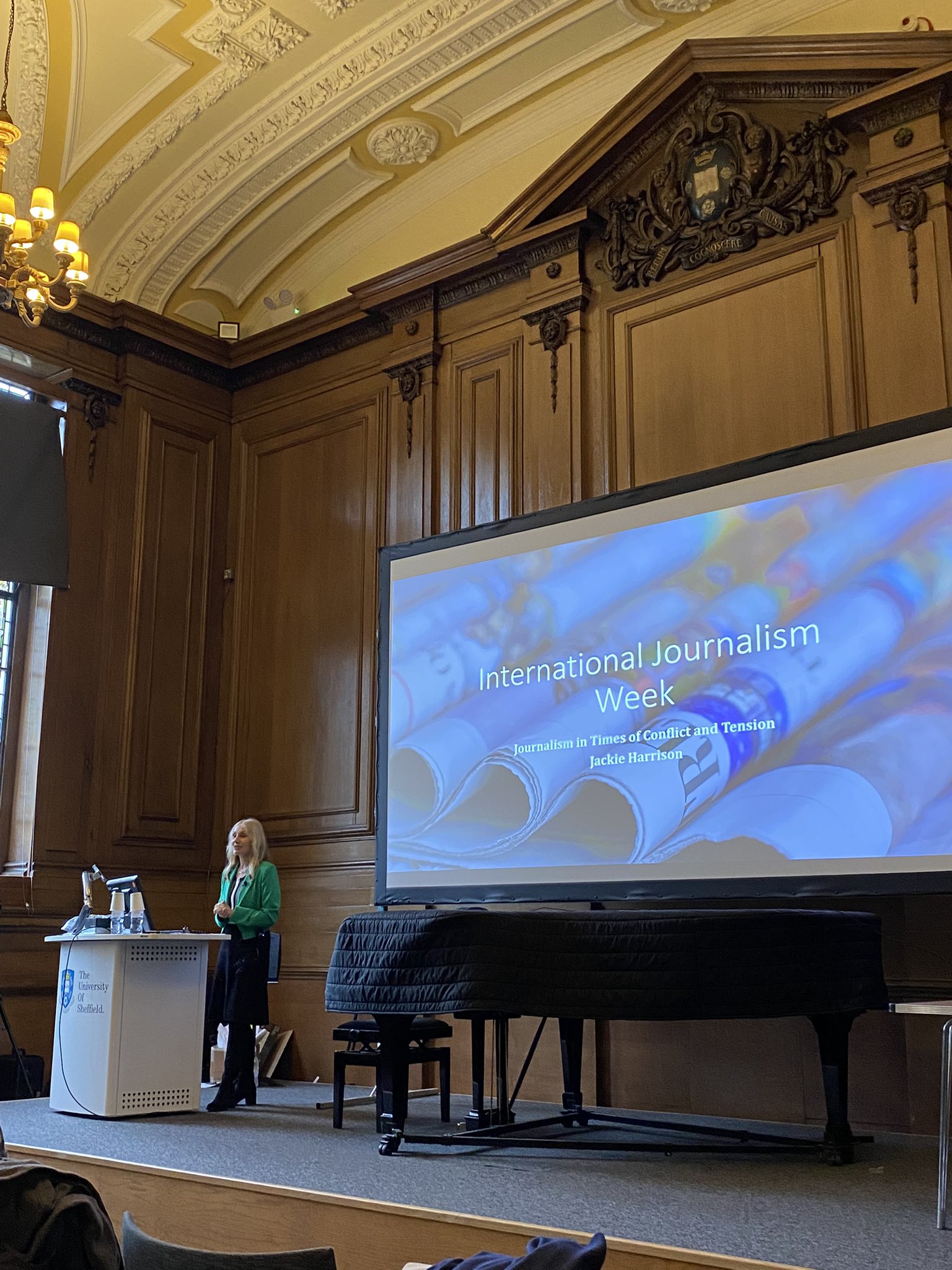
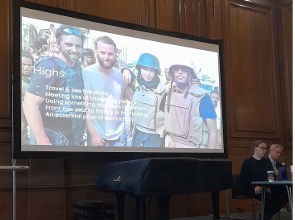
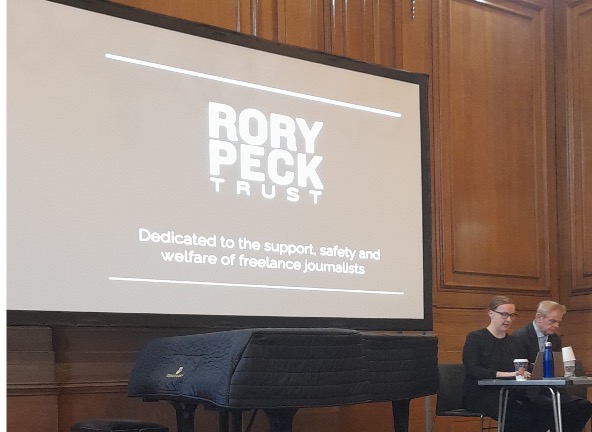
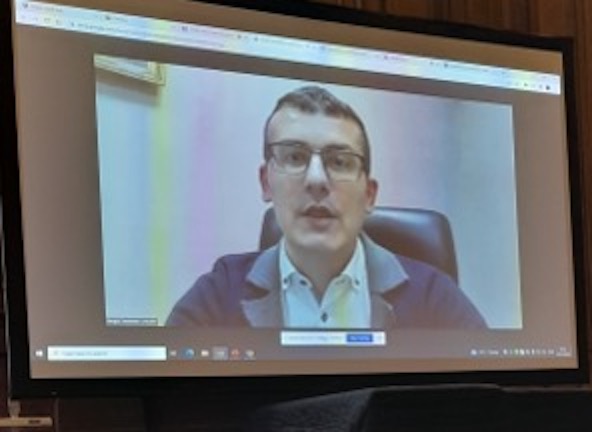
November 18: Symposium on ‘Ending Impunity for Attacks on Journalists’
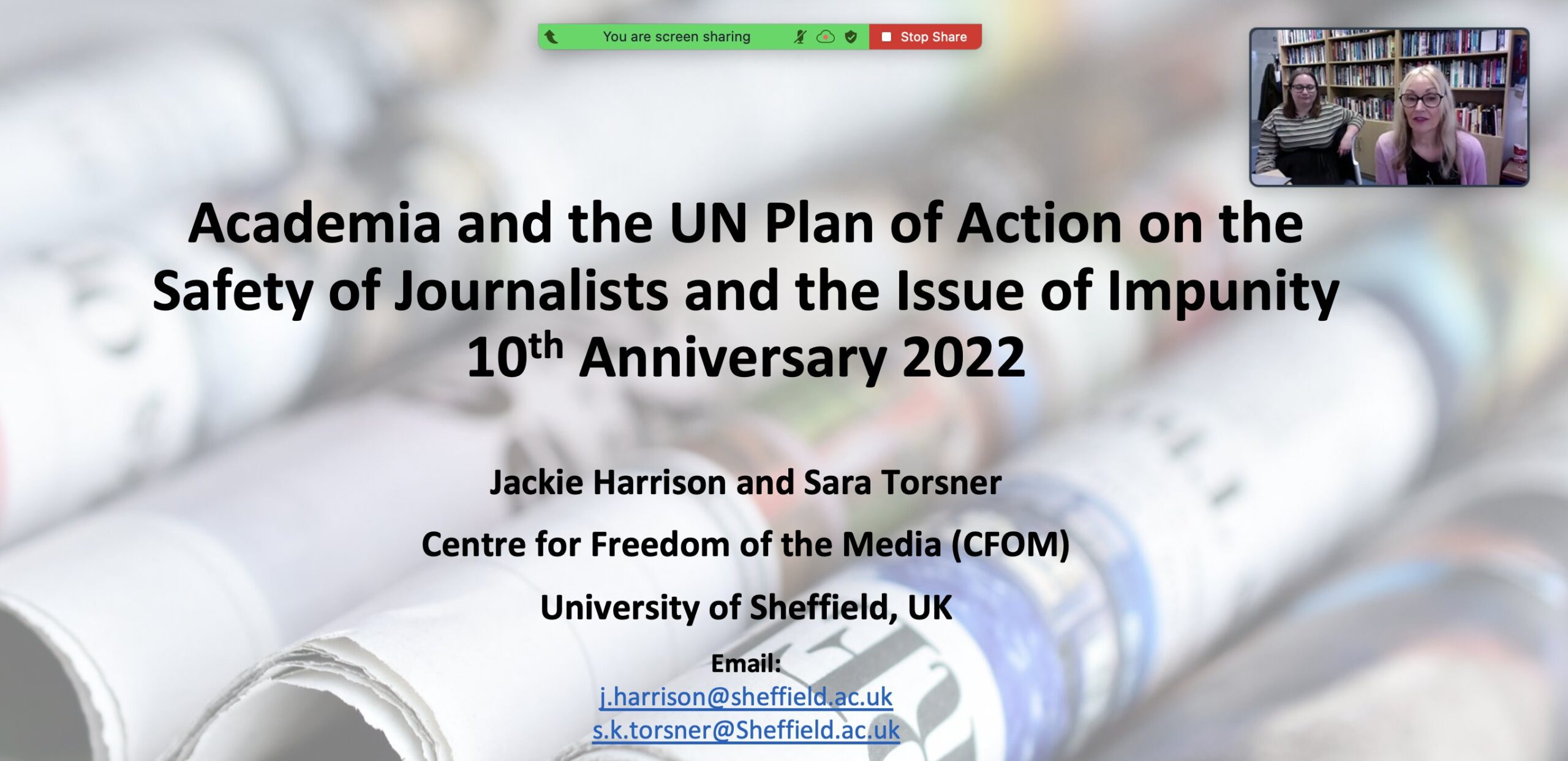
The UNESCO Chair took part in a symposium organised by Brigham Young University’s Professor Ed Carter on 18 November. The symposium was sponsored by Communications Law & Policy. The UNESCO Chair and Dr Sara Torsner delivered one of the keynote talks of the session, emphasising the importance of academia in raising awareness to issues of journalism safety and impunity.
Professor Harrison discussed CFOM’s role in the United Nation’s Plan of Action on the Safety of Journalists and the Issue of Impunity (UNPA) Tenth Anniversary. CFOM has led the academic consultation on the UNPA and Professor Harrison discussed their findings at the Safety of Journalists: Protecting Media to protect Democracy High Level Conference in Vienna, Austria on 3-4 November 2022. The academic consultation included three rounds of discussions concerning the UNPA and potential recommendations that academia could make to improve the implementation of the UNPA alongside a literature stocktake. CFOM’s International Director, William Horsley, and Impact Fellow, Dr Gemma Horton, also took part in the symposium, acting as discussants in panel sessions.
December 2022
December 3: Media Freedom and Impunity of Crimes Against Journalists
On 3 December, the UNESCO Chair took part in a panel discussing media freedom and journalism safety issues around the world. The event, ‘Media Freedom and Impunity of Crimes Against Journalists’, took place between 2-3 December and was co-organised by European Parliament Research Service (EPRS) and Fight Impunity.
Discussions took place at Jean Monnet House and the UNESCO Chair contributed to the panel session ‘Media Freedom and Protection of Journalists in the World’. Professor Harrison discussed the work and research that has been conducted at the Centre for Freedom of the Media (CFOM) in her talk. She emphasised how research had shown that there are key trends in human rights abuses affecting the safety of journalists and constraining media freedom across the world. These key trends include the fact that, while the killings of journalists have declined, there has been a growth in other forms of targeted attacks, such as non-lethal physical violence, kidnapping, torture, arbitrary detention, enforced disappearance as well as legal, digital, psycho-social, gender and identity-based intimidation. She also noted that there are political challenges as global trends have indicated an increase in politically motivated restrictions and diminishment of media freedoms.
In addition to this, Professor Harrison acknowledged that there has been an increase in legislation designed to curtail independent journalism, such as through the use of Strategic Lawsuits against Public Participation (SLAPPs). Online restrictions were also identified as another key trend impacting journalists’ safety and media freedom. In particular, broadband internet shutdowns, mobile internet shutdowns and service-specific shutdowns were emphasised as impacting journalists’ ability to carry out their work.
February 2023
21-23 February: Attended UNESCO’s Internet for Trust Conference
The UNESCO Chair and Professor Stef Pukallus attended UNESCO’s Internet for Trust conference and wrote a commentary piece on concerns surrounding hate speech, regulations and social media. The blog piece was published on CFOM’s website and can be read here.
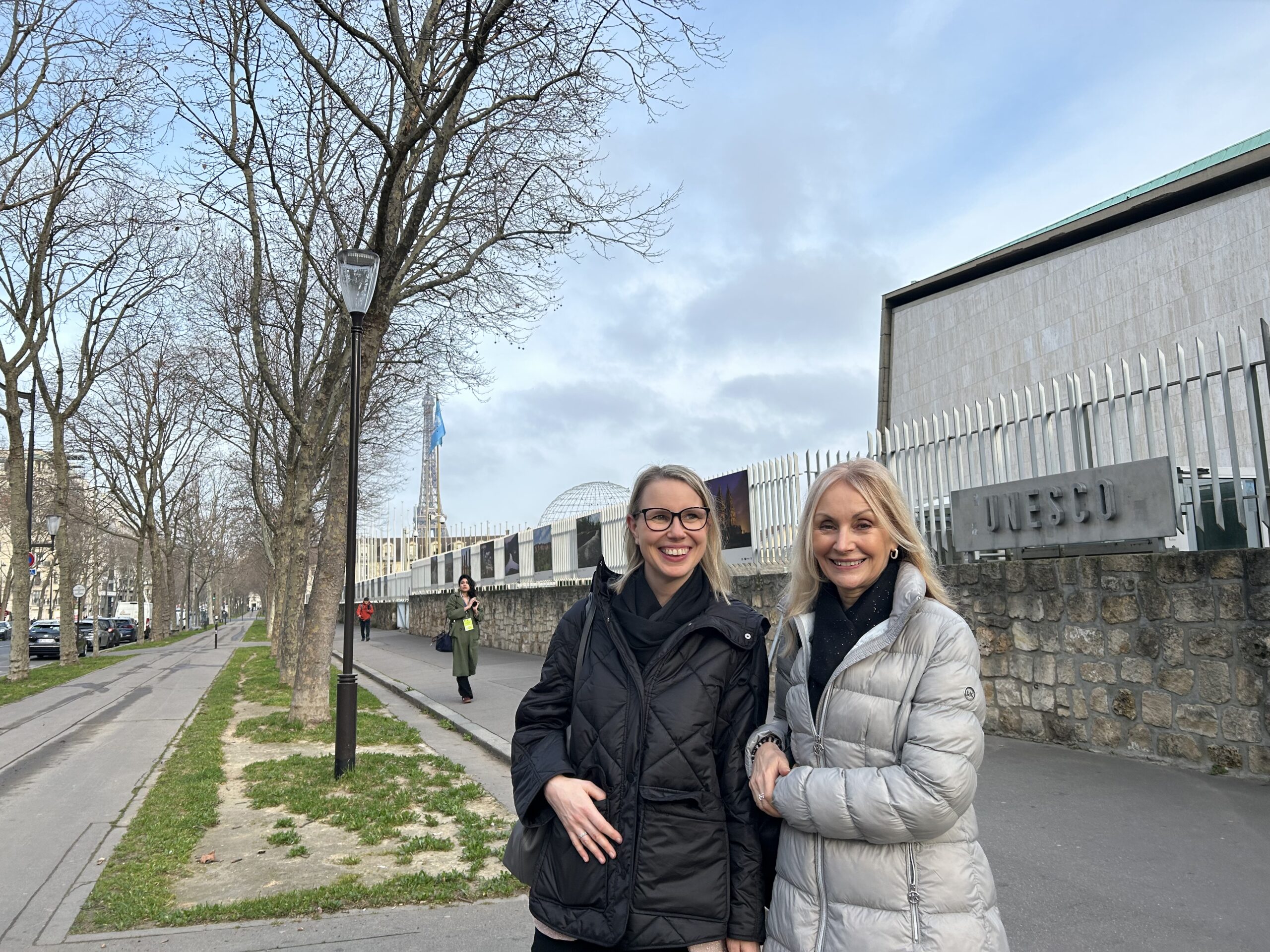
March 2023
March 20: Presentation at the Centre for Applied Human Rights Event: ‘Universities – Civil Society Collaboration to Protect Activists and Enhance Political Space’
The UNESCO Chair attended a workshop organised by the Centre for Applied Human Rights (CAHR), University of York. The conference entitled: ‘Universities – Civil Society Collaboration to Protect Activists and Enhance Political Space’ focused on the role that universities can play in activitism and protecting human rights defenders. The event saw the launch of UNESCO Chair in Protection of Human Rights Defenders and Expansion of Political Space, held by Professor Paul Gready. Professor Harrison delivered a presentation outlining the key role of a UNESCO Chair and spoke in detail about the work at CFOM and the importance of building networks to help with knowledge exchange and building capacity, citing the JSRN.
April 2023
April 27: Online Academic Conference as part of World Press Freedom Day 2023
As part of the 30th anniversary for UNESCO’s World Press Freedom Day, CFOM hosted an online academic conference with the University of Liverpool and Worlds of Journalism. The online conference saw 17 speakers from around the world take part in four panels focusing on threats that pose significant challenges to freedom of expression. The UNESCO Chair opened the session and also delivered a presentation on the role of academia since the implementation of the UN Plan of Action. She also discussed future threats to journalism that need to be explored in further detail and the role academia can play in working with stakeholders to help address these threats.
May 2023
May 1-2: World Press Freedom Day
The academic conference was co-organised by CFOM, University of Liverpool, Worlds of Journalism and Global Freedom of Expression at Columbia University. The conference was opened by Dr Tawkfik Jelassi, UNESCO’s Assistant Director-General for Communication and Information. The UNESCO Chair spoke of the importance of freedom of expression and the role that academia can play in part of understanding the threats. The importance of the JSRN was also emphasised in building a multi-stakeholder approach towards understanding these threats. The academic conference featured 8 presentations in New York and Dr Gemma Horton chaired one of the panel sessions. The UNESCO Chair, Professor Stef Pukallus and Dr Gemma Horton attended the main commemoration on occasion of the 30th anniversary for UNESCO’s World Press Freedom Day which was hosted at the United Nations, New York, United States.
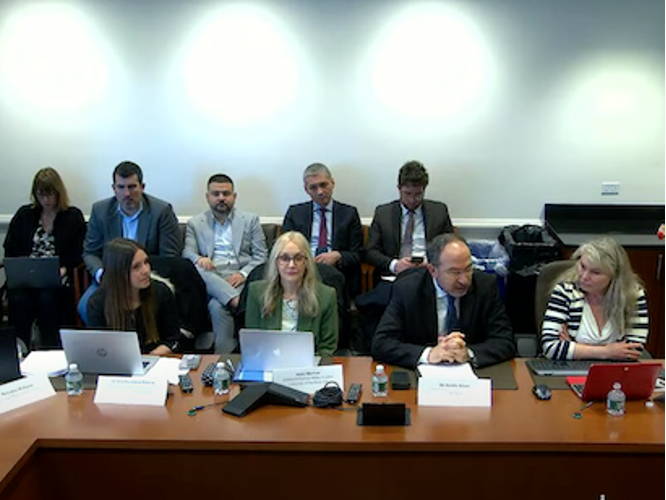
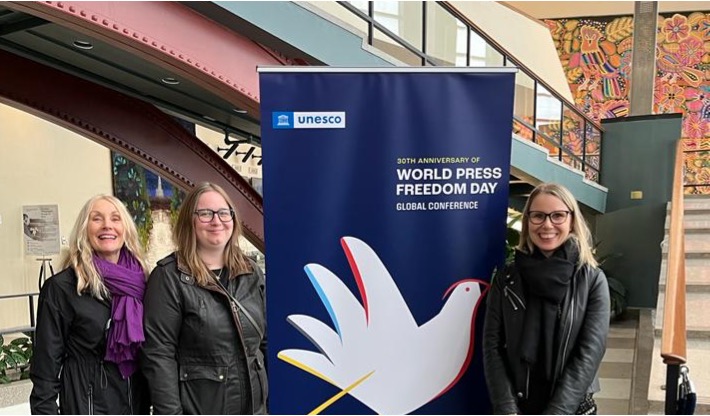
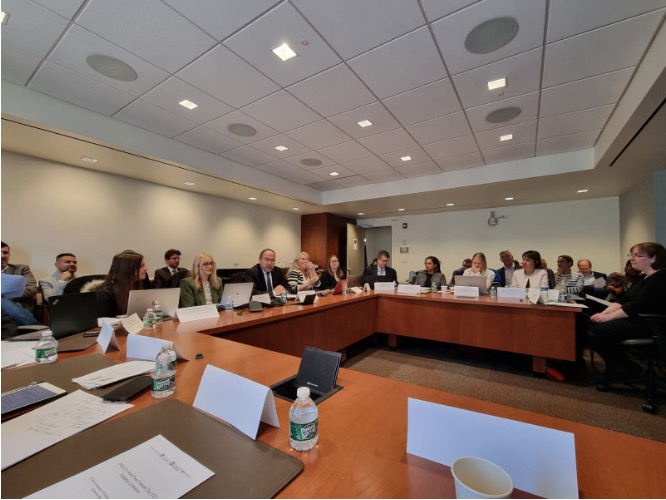
June 15: Opening Remarks at JETREG’s ‘Living to tell the tale – building community resilience in journalism’
The UNESCO Chair delivered opening remarks for the Journalism Education Trauma Research Group (JETREG) international conference. She spoke about the importance on work and research surrounding the problem of emotional and psychological stress in journalism practice.
July 2023
July 12: Presentation at International Association of Media and Communication Research (IAMCR) Conference
The UNESCO Chair and Professor Stef Pukallus delivered a presentation focusing on journalists/journalism in exile. It was suggested that there needed to be more of a focus on journalists/ism in exile in the UN Plan of Action as numbers of journalists in exile remain high and continue to increase. Journalism Safety has long been a policy priority for international policy-makers (EU, UNESCO, European Council and NGOs) with the UNESCO Plan of Action on the Safety of Journalists and the Issue of Impunity launched in 2012 representing one of the main global initiatives. What is conspicuously absent from the journalism safety agenda are references to and concerns for journalists in exile and correspondingly, any measures to protect both journalists and journalism in exile.

September 2023
September 17-19: ‘Future of Media and Communication’ Forum
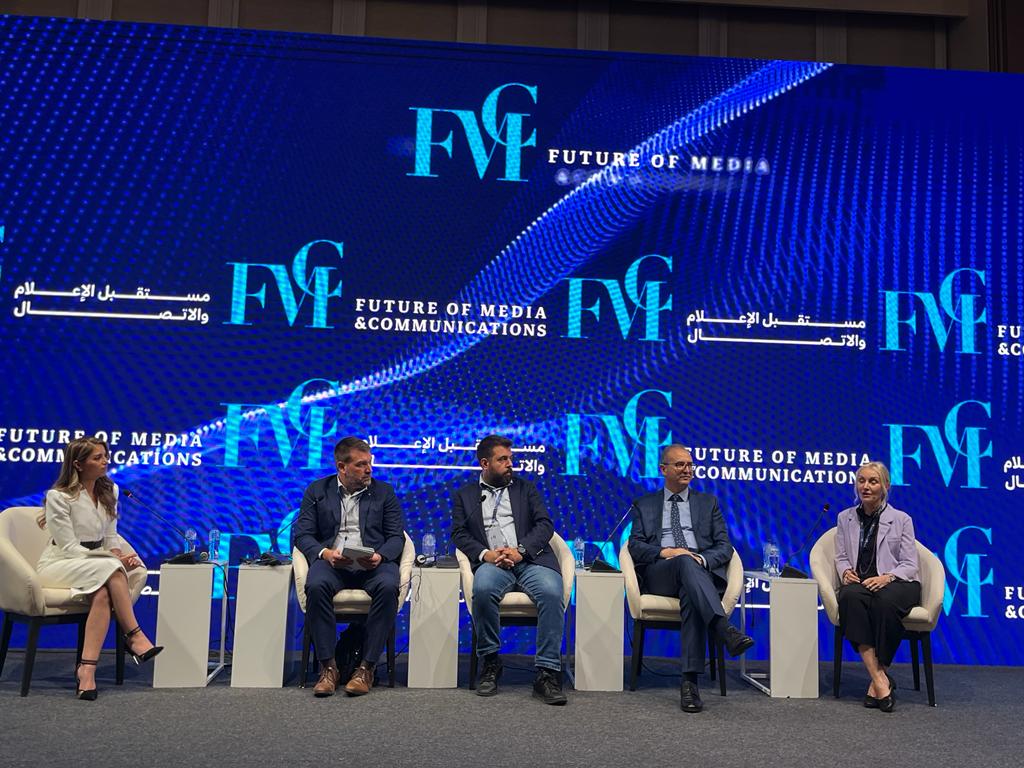
The UNESCO Chair took part in the ‘Future of Media and Communication’ Forum that was organised by the Center for Defending Freedom of Journalists (CDFJ). The event was held in Amman, Jordan from 17-19 September and the UNESCO Chair spoke about UNESCO’s mandate to monitor the killings of journalists to deal with targeting journalists and how the work UNESCO has undertaken has acted as an umbrella to protect journalists.
September 27: ‘Journalism in Exile Panel’
CFOM and the Hub for the Study of Hybrid Communication in Peacebuilding (HCPB) hosted a joint event focusing on journalism in exile with two presentations. CFOM member Dr Ilya Yablokov spoke at the event. The UNESCO Chair also presented a paper entitled ‘Journalism Safety and the surprising exclusion of journalists/ism in exile’ which detailed how journalists in exile are absent from journalism safety agenda. She explained that this is a significant oversight which risks international policy-makers as being (un-)intentionally compliant in the silencing of journalists and enabling impunity by national governments across borders.
October 2023
October 16-20: Heidelberg Workshop
In October 2023, the Chair travelled to Heidelberg, Germany to attend a workshop where she presented a research presentation titled: ‘The nascent global civil sphere and the global news-scape (GNS)’. This work builds on and develops her book on the Civil Power of the News which was published by Palgrave in 2019. In the presentation, she discusses how the nascent global civil sphere is both sustained and nourished by the civil power of the civil global news scape and news journalism that aspires to a civil ideal. She has also written a book chapter for Routledge based on this work.
November 2023
October 30-November 2: International Journalism Week
The UNESCO Chair delivered a keynote speech as part of International Journalism Week on 30 October. She spoke about the threats that journalists face in the work that they do alongside the issue of impunity. She also addressed how the range of threats journalists face has grown and include online harassment, legal harassment and economic harassment, to name but a few. CFOM’s ESRC Postdoctoral Fellow, Dr Tamsin Mitchell also delivered a talk as part of IJW and the Festival of Social Science on 1 November where she spoke about journalism safety in Mexico and Honduras. CFOM’s International Director, William Horsley, also moderated a panel focusing on the misuse of media law where speakers included: David Banisar, visiting Senior Fellow at the London School of Economics; Philip Leach, Professor of Human Rights Law at Middlesex University in London; and Dr Irini Katsirea, Reader in International Media Law at the University of Sheffield.
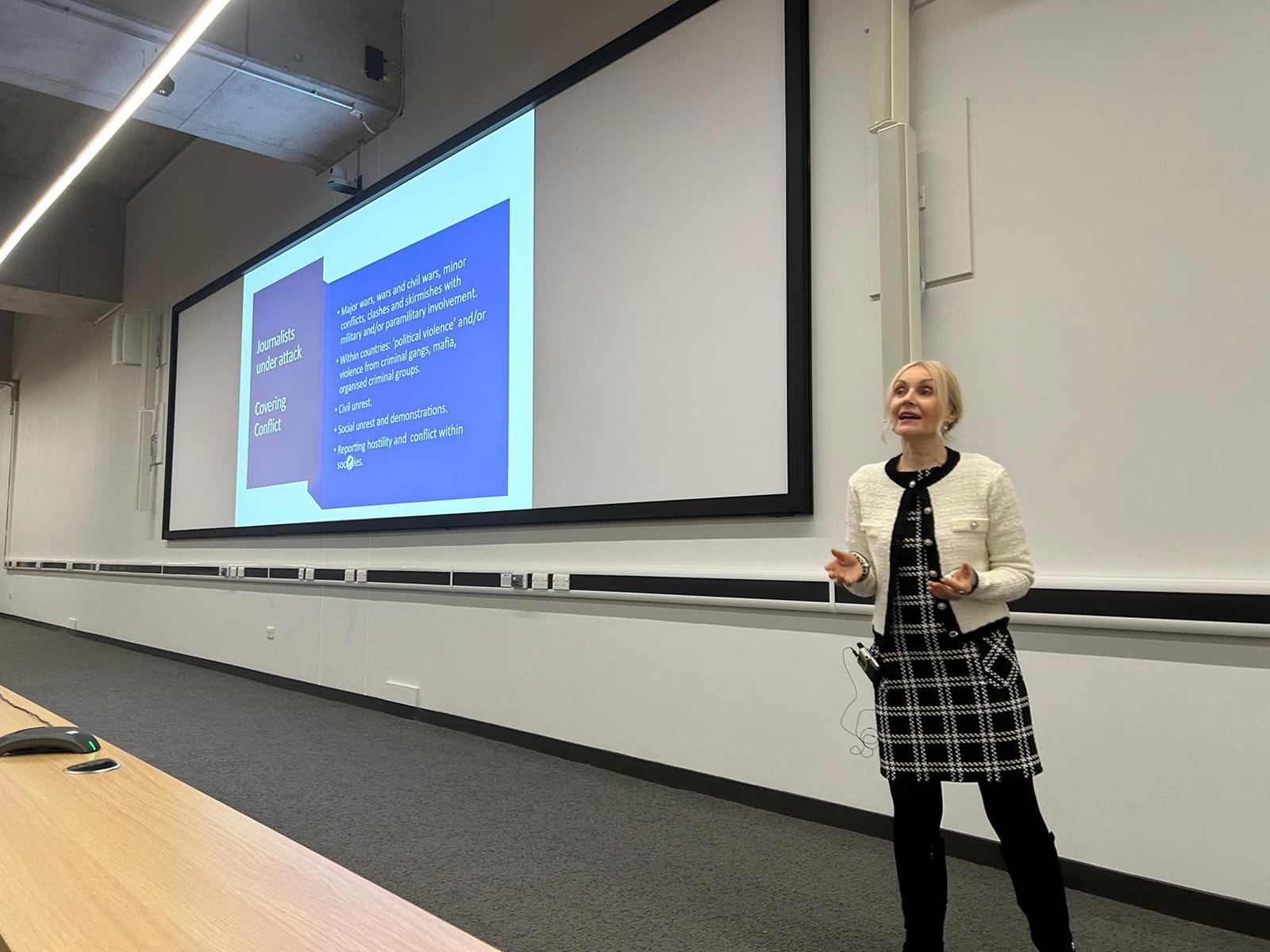
November 23: Guest on CFOM Podcast
In November, CFOM launched their podcast and the UNESCO Chair was one of the first guests. The UNESCO Chair spoke about how CFOM was founded and the work that the Chair undertakes alongside why it is important to speak up about issues of media freedom
2024
February 2024
February 6-9: Research Secondment
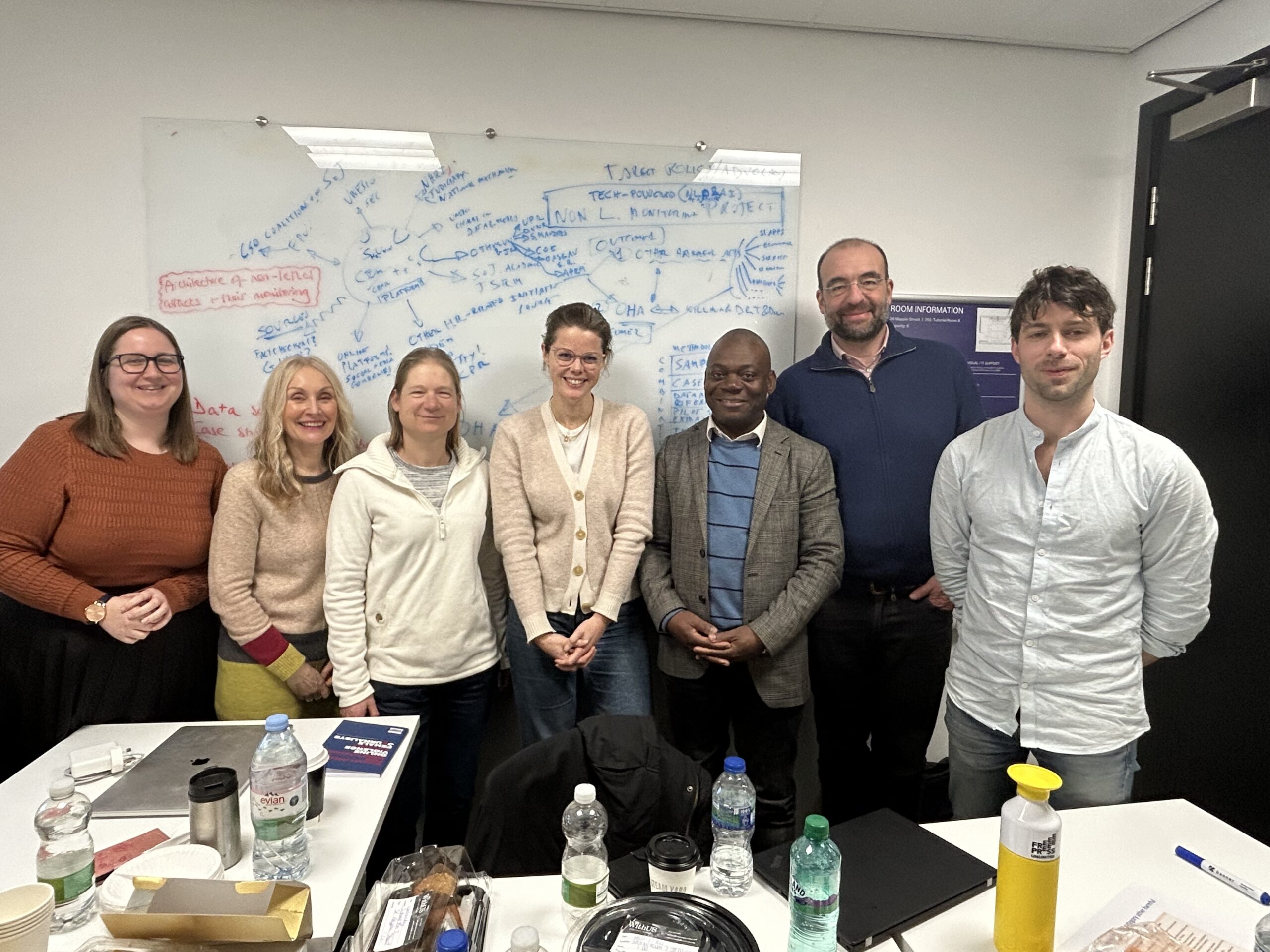
The UNESCO Chair hosted a secondment at the University of Sheffield between academics within CFOM, members of Free Press Unlimited and representatives from UNESCO. The aim of the secondment was to provide a space to discuss how UNESCO can make a contribution to the monitoring of non-lethal attacks on journalists as a response to their mandate form the IPDC to move beyond monitoring and reporting on killings. This builds on the work that the Chair has been involved in concerning the monitoring of attacks against journalists that is in line with Sustainable Development Goal 16.10.1. The secondment provided a space to discuss how to monitor ‘other harmful acts’ against journalists and the type of data that would need to be collected. It also provided a chance to bridge the gap between academia, civil society organisations and UNESCO. The secondment concluded with a plan to design a concept note that will discuss next steps in terms of developing the collaborative project.
July 2024
July 12: Interview with UNESCO
The UNESCO Chair took part in an interview with UNESCO about the work of the UNESCO Chair. In the interview, she spoke about the abuse of state power and how it is becoming more prevalent and the consequence of this is a downward spiral of a reduction of freedom of expression. She also spoke about the work CFOM is undertaking examining how the law is being weaponised to attack journalists, including through the use of Strategic Lawsuits against Public Participation (SLAPPs). The interview can be found here.
